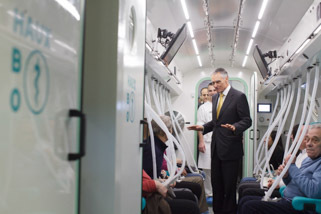
Madam Minister for Culture,
Madam Mayor of Vila Franca de Xira,
Honourable Speaker of the Municipal Assembly,
Ladies and Gentlemen,
My congratulations are due to the Municipality and to the Mayor of Vila Franca de Xira, as well as to all who were active in the creation of the Museum of Neo-Realism.
The housing in this building of an area eminently suitable for research and dissemination of knowledge, the municipality of Vila Franca de Xira is demonstrating not just the diligent attention and care it dedicates to cultural heritage, but also places at the disposal of all interested parties a set of state of the art equipment which will surely allow acquiring a wider knowledge of an essential part of our recent history.
The Museum of Neo-Realism is not just a tribute to a more than 50 year old literary flow.
Due to the wealth of the documentation kept here and to the ambition of its programme of activities, this museum represents a real tribute to 20th century Portuguese culture.
I am certain that its projection will go far beyond the geographical limits of this city and will benefit all the researchers or individuals avid for knowledge who, in the University or outside its limits, in Portugal or abroad, are interested in Neo-Realism.
The dream of those who, almost twenty years ago, launched the bases of a centre of studies on Neo-Realism is now finally come true. From now on, this fine building designed by Alcino Soutinho, one of Portugal’s most prestigious current architects, is open to all who wish to become acquainted with what was certainly one of the most arguable and, for this reason, one of the liveliest literary and artistic undertakings of our 20th century.
There are good reasons for us to consider Vila Franca de Xira as an appropriate location for this museum, notwithstanding the national dimension achieved by Neo-Realism.
Alves Redol, one of the names better identified with the movement and author of “Gaibéus”, considered by the intelligentsia the first Portuguese neo-realistic novel, was born and bred here.
Not far, in Alhandra, lived and worked Soeiro Pereira Gomes, another of the better known authors of Neo-Realism.
In this region, cultural, social and political associative movements were always very dynamic, thus mustering a particularly attentive public to neo-realist authors whose commitment to those more disfavoured was the symbol of their literary production.
Here, as in the whole of Ribatejo and in other areas of the Country which were punished with extreme poverty for many decades, neo-realists found abundant subject matters for their novels, poetry, plays or even paintings.
The value of one or another of such works may possibly be arguable.
Ideological options reflected in such works can and should be discussed.
But it is undeniable that some of the more significant literary and artistic values of the 20th century arose from Neo-Realism.
Carlos de Oliveira, Manuel da Fonseca or Fernando Namora, just to mention the better known, are justifiably continuing to deserve the respect of many readers.
Júlio Pomar or Lima de Freitas, artists who in the beginning of their careers belonged to the neo-realist movement, will always remain figures of repute in the world of our plastic artists.
It is also undeniable, and not less relevant, that in many Neo-Realistic works, due to their authenticity, we can arrive at an understanding of what was, in those days, the poverty of many families. Their unconformity was just the wish for a dignified life.
Neo-Realism, with all the arguments it caused, with all the publications and other initiatives arising from it, is these days an obligatory theme for whoever wishes to find out what was last century’s intellectual, social and political life.
Ladies and Gentlemen,
A word of thanks is due to the families of Alves Redol, Orlando da Costa and Mário Sacramento for their contribution towards the enrichment of the museum by having officially donated, today, their respective heritage.
I renew my congratulations to the city of Vila Franca de Xira and hope that the Museum of Neo-Realism, inspired in the values of freedom and solidarity that guided so many of the manuscripts kept here, becomes a dynamic focus of our cultural and civic activity.
Thank you very much.
© 2006-2016 Presidency of the Portuguese Republic
You have gained access to the records of the Official Site of the Presidency of the Republic from 9 March 2006 to 9 March 2016.
The contents available here were entered in the site during the 10 year period covering the two mandates of President of the Republic Aníbal Cavaco Silva.